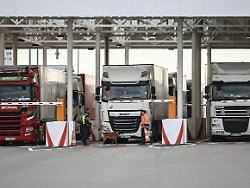Saturday 19th December 2020
Introduction to the EU prohibited
Brexit takes ham off the bread for truckers
London worries about catering for British truck drivers destined for the EU. Because from January the import of meat and dairy products is prohibited. Truckers' sandwiches could fall victim to the ban. The responsible ministry gives tips on how to deal with it in the future.
It's over for the ham and cheese sandwich on the way: Brexit is also having an impact on the catering for truck drivers and travelers en route from Great Britain to the European Union. Products made from animal meat or milk will no longer be allowed to be imported into the EU from January 1, the Ministry of Transport announced in London. The authorities cited a ham and cheese sandwich as an example.
"God help the poor customs officer who throws away a driver's grocery box. I wouldn't be surprised if they get punched when they try," freight forwarder Simon Wilkinson told The Guardian. "When drivers go to Europe, they take things with them for days and weeks."
According to the ministry, exceptions apply to certain quantities of baby food or specially processed animal feed. "If you have prohibited items in your luggage or vehicle, you will have to use, consume or dispose of them before or at the border." The import of some types of plants into the EU would then no longer be permitted.
Meanwhile, British MPs have accused the government of negligence. A few days before the end of the Brexit transition phase, they are concerned about the state of preparation for the changes that will take place at the turn of the year, said the members of the Committee on Future Relations with the EU. Some decisions were made too late.
Government cannot tell citizens what is happening
In a report, the cross-party parliamentary committee criticized the slow conversion of IT systems, for example at ports. Companies would not have enough time to adjust to the new systems. A new infrastructure for customs and border controls must also be built in the ports. The allocation of state funds for the work was too slow.
Great Britain left the EU on February 1, but the country will remain in the EU internal market and the customs union until the end of the year. Negotiations on a trade agreement for the time thereafter have so far been unsuccessful. Without an agreement, customs duties would be levied in mutual trade at the turn of the year – with serious consequences for the economy.
Seven working days before the end of the transition period, there are still "significant concerns," said Labor MP Hilary Benn. The government can still not reliably tell companies and citizens "what will happen in all the areas affected by the negotiations".
.
